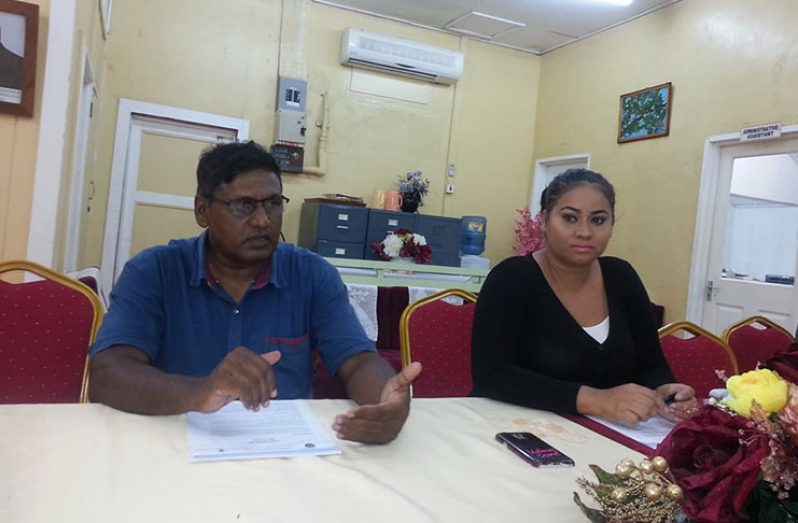-LHC internal probe finds
THE Linden Hospital Complex has completed its internal investigation into the maternal death of 41-year-old Jennifer Gill which took place on Monday evening and it is affirmed that she died of kidney failure as a result of haemorrhaging.
The haemorrhaging was caused by a blood disorder called blood dyscrasia which is a condition of the blood not clotting fast enough. At a press conference on Wednesday, Public Relations Officer, Toshanna Allicock, said that Gill started haemorrhaging after giving birth on Saturday evening and after efforts to stop the bleeding proved futile, a decision was made to perform a hysterectomy. It was during surgery that she experienced a hypovolemic shock.
This is a condition that results when you lose more than 20 percent of your body’s blood or fluid supply. This severe fluid loss makes it impossible for the heart to pump a sufficient amount of blood to your body and this can lead to organ failure. After the surgery, the hospital explained that the woman was placed in the Intensive Care Unit where she subsequently went into a cardo respiratory arrest and resuscitation was attempted, but proved futile. She died at 20:30 hrs on Monday.
“Ms Gill was treated by expert doctors from the time she entered into our care to the very end. The immediate family was updated on her condition throughout her time with us. I hold firm that our institution is equipped with competent and compassionate doctors who aim to deliver the best quality care to our community,” Allicock said.
Explaining further was Chief Executive Officer, Dr. Mohammed Riyasat, who said that Gill was never prepared for a C-section as asserted by family members who claimed that a C-section was not done because of the absence of doctors. “When the patient arrived the doctor was on site. The doctor did evaluate the patient and that doctor initiated the call for the consultant who arrived at 9:40 and by the time she was here, she did another evaluation and the patient was fully dilated which means that she was ready to deliver. This patient delivered with no problem; bouncing baby and that was okay, but half of an hour after then the nurse noticed that she started getting a little bleeding and then it started again and the doctor said something is wrong with this patient and there the doctor made a decision to take out the uterus. The patient was normal and talking and everything,” Riyasat explained.
While this was done, all the necessary medication was given during this post-delivery situation. It was in the theatre that the complications arose because of a blood disorder called blood dyscrasia. “She was bleeding faster than the blood was clotting. What you found is that the blood got thinner and when the kidneys sensed that there was not much oxygen flowing through in the blood, it starts shutting down. When she came out and was sent to the ICU, she wasn’t passing any urine. Until the next day she wasn’t passing any urine and, as a result of the kidney failing and the loss of blood, she died.”
During this 48-hour period, the team of doctors including specialists, consultants and surgeons, remained with her and was updating the family members on her progress and they were also allowed to see her, the CEO said.
Medical Superintendent Remeeza McDonald said that it was only on her way to the theatre that the patient related that she had a blood disorder and experienced haemorrhaging during her delivery 20 years ago. The normal clotting and bleeding tests that were done, Riyasat explained, could not have picked up her disorder. “If a C-section was done, the patient would have died before. In this case there were no criteria for a caesarean. If a patient has a blood disorder with a clotting problem and you go and put knife on her, she would not have lasted as long as she lasted,” the CEO said.
A post-mortem examination was scheduled to be conducted on Wednesday but was postponed as family members are pressing for an independent person to witness the post-mortem from overseas. Riyasat said that the hospital will now put stricter systems in place to make sure that patients’ medical history are known before hand while having closer collaboration with the medical staff at the health centres and the medical staff at the hospital. It has been nine years since LHC recorded a maternal death.



.jpg)








